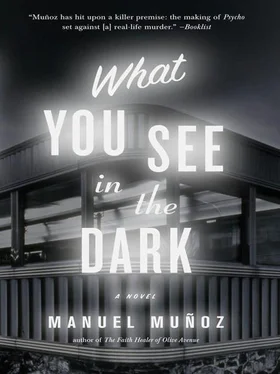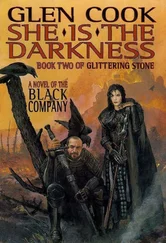The pickup truck is absolutely still — or is it moving? There is no telling what they are or are not doing in there. Who could push away Dan Watson? Because the speaker is off, from way over in the distance a girl’s furious moans carry along the dirt lane, then some quiet laughter from people sitting on their hoods, watching the movie. Whoever heard that laughter — how people react when exposed to that kind of desire, with laughter or disgust or disapproval — might stop what they were doing. But it’s happening all across the darkness, panties slipping off and resting playfully on the gearshift, on the radio knob. Yours is twenty-three and doesn’t know what he’s doing and he admits that he’s a virgin in a terrified voice. He thrusts and it feels good only because you close your eyes and picture yourself in the pickup truck instead, the way Dan walks, the waitresses who feel dirty for thinking of him that way because they knew him when he was a little, little boy. They know his mother. You close your eyes and think of Dan but concentrate on this boy, holding him at the hips when he begins rocking too fast, getting carried away to a point when he won’t be able to control himself. He’s sweet in his earnestness — he truly is — and he stops when you tell him to do so, his face covered in sweat. He looks like he is about to cry.
Car engines begin to turn on even before the movie is over, and horns blast at the disorder — some people want to know who committed the murder, who made the beautiful girl scream like that. The pickup truck stands absolutely still, the silhouettes hard to pick out now because of the shifting lights and shadows. It’s time to sit back up in the seat, since people are watching now, and adjust bras, close blouses. More and more cars begin to pull out, so many there’s actually a line for the exit. It is better to wait. The twenty-three-year-old boy is in love. You can tell by the way he sits there, his pants back on, but the bulge straining. He wants a kiss.
That is the difference between him and a man like Dan. This boy hasn’t yet learned the power of wielding his body — giving it over — like a little boat on an ocean, the thing you cling to, getting rocked to sleep by the waves. He thinks he’s in love.
And why shouldn’t he, after a night like that? It’s easy to think that’s what love is, after being naked in front of someone for the first time, as if it truly were an act of tenderness, of sacred honor. In truth, love crumbles into something else, an answer to lying awake at two in the morning, when the body demands one thing and one thing only. The cars drive back into the sleepy streets of Bakersfield, letting off dates at the porch-lit houses, last kisses before the neighborhood dogs begin to bark at the idling engines. Soon the boy will start the hand-holding and the flowers — cheap grocery-store flowers, not Holliday’s, but flowers nonetheless because that’s what sweet, earnest boys do.
After October, the drive-in closes for the winter. Saturday nights become a slow circle around a little stretch of Union Avenue, the streetlights glimmering off the new wax jobs. Cars stop over at the Jolly Kone hamburger stand or at the edges of the dark city park. Winter fog keeps many people home, as if the cold were unbearable. Still, as the weeks go on, the bars begin to do substantial business, especially the ones that serve a little food early enough to draw a crowd that stays the entire evening. Traveling bands arrive in Bakersfield for special appearances, the bars competing with one another for the best of Los Angeles, sometimes even selling tickets in advance at the record shop.
In the newspaper, a little ad appears in mid-November, a curious drawing. A dark-skinned woman stands in front of a microphone. “La Reina,” says the ad. “Este Domingo.” And below is the address to Las Cuatro Copas. It is a drawing, not a photograph. It is that girl. Undeniably. There is something provocative about the advertisement, something deliberate about its simplicity, the fact that she is a local talent. Customers from the shoe store will surely recognize her. You leave the newspaper on the storeroom counter, conspicuous, to show her that you’ve seen it, but she says nothing about it. In the drawing, she stands in front of the microphone with her lips open, but who knows what might come out of her mouth. The advertisement appears again later in the week in an evening edition, same bold type, same language, same held note. At the shoe store, you swear people are peeking through the windows to get a glimpse of her. It isn’t surprising when, on Sunday night, Las Cuatro Copas is packed, not one table unoccupied.
People arrive dressed as if it were a Saturday, all fine ties and shiny boots and dresses. No one licks their fingers after eating the chicken legs and taquitos, the plates carried away just as quickly as they arrived. Conversations float by in Spanish — all of them in Spanish. Some of the Mexican men have even come with blond American women, heedless of the hard glares. These couples have little to say to each other, though sometimes the women jabber on to fill the quiet space between them. Here, everyone is out in the open — it is clear who brought whom, who is being distracted, who is being worn away by jealousy, and who is going to be brokenhearted. It is not the drive-in, where the darkness lulls everyone into thinking that lust is an easy, clean jump over to the wide path of love on the other side. In the dim club, the true complications of being in love show themselves in flashes, like a wedding ring catching a burst of light. A dark-haired woman drinks too much for so early in the evening and you can tell she’s trying but unable to leave the man who brought her. A very young couple sits over near the back, sitting so close together they seem almost afraid of being affected by everyone around them, and the way the young man nods at the girl when she comes around for an order — nods but doesn’t say much of anything — you can tell that neither he nor his young date speak English. He is surprised that the girl takes his order in Spanish with ease. That man over there gives another woman the once-over, his hand distracted on his own date’s back. Both women notice and look away in hard, granite anger.
Who knows, really, why they came tonight, if they’ve been paying attention to that girl and noticed her comings and goings. Who knows why they thought this evening warranted ironing a fresh shirt instead of just airing out the one from the night before, damp as it was from dancing and smoky when you put your nose to it. But here they were, their tables cleared but not stacked over in the corner as they usually were on dancing nights. Maybe later, but now just their clean tables and their chairs to sit in and a last round of drinks, the girl gone to the back of the club and the lights dimmed even further, so dark the crowd actually goes quiet and focuses on the small halo of light at the center of the cantina. So quiet you can hear the boots of the bartender boyfriend against the wood floor as he approaches the light, guitar in one hand, a microphone stand in the other, the cord snaking behind him. Someone rises from the crowd to pull over a blue velvet stool for him and Dan says thanks, tapping his fingers against the microphone. “Uno, dos, tres,” he says, perfectly, which prompts an almost nervous laughter from some in the crowd. You think: He knows how to speak Spanish. He might understand what people have been saying. The microphone in working order, he waves off to the side, and out of the dark comes the waitress girl, out of her serving apron and wearing instead a beautiful cowgirl dress. Baby blue satin with white fringe. Of course, you notice that she’s wearing what look like last season’s brown boots, and you foolishly try to make her see that you’ve noticed, but your face is lost in the dark. The boots don’t match the dress, but it’s too dark for anyone else to really care. All eyes are on the gorgeous satin, the way it catches what little light there is, the arrow detailing beginning at her shoulder and descending, circling each breast, the silver lacing deep inside the fringe, which sparkles to attention when she adjusts the microphone.
Читать дальше












